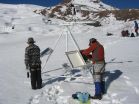(Press-News.org) Prior to the advent of human-caused global warming in the 19th century, the surface layer of Earth's oceans had undergone 1,800 years of a steady cooling trend, according to a new study. During the latter half of this cooling period, the trend was most likely driven by large and frequent volcanic eruptions.
An international team of researchers reported these findings in the August 17, 2015 issue of the journal Nature Geoscience. The study also indicates that the coolest temperatures occurred during the Little Ice Age--a period that spanned the 16th through 18th centuries and was known for cooler average temperatures over land.
The concurrence of cooling events on both land and sea suggests that a global cooling phenomenon was erased by subsequent human-caused global warming.
"Today, the Earth is warming about 20 times faster than it cooled during the past 1,800 years," said Michael Evans, second author of the study and an associate professor in the University of Maryland's Department of Geology and Earth System Science Interdisciplinary Center (ESSIC). "This study truly highlights the profound effects we are having on our climate today."
Compared to the atmosphere, the oceans can absorb much more heat and trap it for longer periods of time. Thus the ocean can buffer short-term changes in global temperature. But when events such as volcanic eruptions cluster together in a relatively short period of time, the temperature changes can become prolonged.
"Volcanic eruptions have a short-term cooling effect on the atmosphere, but our results showed that when volcanic eruptions occurred more frequently, there was long-term ocean cooling," said lead author Helen McGregor, an Australian Research Council (ARC) Future Fellow at the University of Wollongong in Australia. "With this research, we now have new insight into the century-scale global sea-surface temperature variations that came before man-made greenhouse gas forcing."
The scientists are the first to combine 57 previously published marine surface temperature reconstructions that cover all of the world's oceans, from near-polar to tropical regions. The team compiled the data within 200-year brackets to observe long-term trends, and then compared the findings to land-based reconstructions, which revealed similar cooling trends.
"No matter how we divided the data set, the cooling trend stands out as a robust signal," McGregor said.
To investigate the cause of the cooling trend, the researchers turned to climate models. They examined how sea-surface temperatures reacted to various "forcing" factors, such as changes in solar output, Earth's orbit, land use, volcanic activity and greenhouse gases. Only volcanic events resulted in a cooling trend that matched the team's real-world observations.
Understanding how forcing factors changed ocean temperatures in the past can open a window into future climate change.
"Model simulations by others have shown us that the oceans can impart a substantial delay in the warming of the surface climate," said Evans, who is also the lead of the Ocean2k working group of the Past Global Changes (PAGES) program. "With much of the heat from global warming entering our oceans, recent ocean surface warming may foreshadow additional future warming, in the same way ocean cooling appeared as a long-term response to large and frequent volcanic events in recent centuries."
"We are still learning how the oceans mediate climate variations," Evans added. "Further work combining both observations and simulations of ocean climate will refine our understanding of the ocean's role in climate change."
INFORMATION:
This research was funded by the National Science Foundation, the National Oceanic and Atmospheric Administration and the Swiss National Science Foundation via the PAGES (Past Global Changes) Program, as well as 22 additional grants and fellowships awarded to individual researchers and institutions. The content of this article does not necessarily reflect the views of these organizations.
The research paper, "Robust global ocean cooling trend for the pre-industrial Common Era," Helen McGregor, Michael Evans, et al., was published August 17, 2015 in the journal Nature Geoscience.
Supplemental information about the study, including FAQs, data, figures, and photos are available on the PAGES website: http://www.pages-igbp.org/ini/wg/ocean2k/faq-pre
Media Relations Contact: Matthew Wright, 301-405-9267, mewright@umd.edu
University of Maryland
College of Computer, Mathematical, and Natural Sciences
2300 Symons Hall
College Park, MD 20742
http://www.cmns.umd.edu
@UMDscience
About the College of Computer, Mathematical, and Natural Sciences
The College of Computer, Mathematical, and Natural Sciences at the University of Maryland educates more than 7,000 future scientific leaders in its undergraduate and graduate programs each year. The college's 10 departments and more than a dozen interdisciplinary research centers foster scientific discovery with annual sponsored research funding exceeding $150 million.
CHICAGO --- Some stressful experiences - such as chronic childhood abuse - are so overwhelming and traumatic, the memories hide like a shadow in the brain.
At first, hidden memories that can't be consciously accessed may protect the individual from the emotional pain of recalling the event. But eventually those suppressed memories can cause debilitating psychological problems, such as anxiety, depression, post-traumatic stress disorder or dissociative disorders.
A process known as state-dependent learning is believed to contribute to the formation of memories that ...
17.08.2015: Glaciers in Central Asia experience substantial losses in glacier mass and area. Along the Tien Shan, Central Asia's largest mountain range, glaciers have lost 27% of their mass and 18% of their area during the last 50 years. An international research team led by the GFZ German Research Centre for Geosciences and including the institute of the French Centre National de la Recherche Scientifique (CNRS) at Rennes University in particular, estimated that almost 3000 square kilometres of glaciers and an average of 5.4 gigatons of ice per year have been lost since ...
Lueneburg. Sustainability Scientists at Leuphana University of Lueneburg have devised a simple screening-based predicting procedure for region-specific environmental risks caused by veterinary antibiotics (VA). This procedure, called Usage Pattern-based Exposure Screening (UPES), makes use of utilization patterns of antibiotics in animal husbandry. By improving targeting, it enables the identification of particularly problematic antibiotic substances. It also enables the implementation of more advanced risk prediction tests, for example with the help of soil and water ...
DURHAM, N.C. -- We've all seen dewdrops form on spider webs. But what if they flung themselves off of the strands instead?
Researchers at Duke University and the University of British Columbia have now observed this peculiar phenomenon, which could benefit many industrial applications. As long as the strands are moderately hydrophobic and relatively thin, small droplets combining into one are apt to dance themselves right off of the tightrope. The discovery could form the basis of new coalescer technologies for water purification, oil refining and more.
The findings ...
Seasonal water shortages already occur in the Central Andes of Peru and Bolivia. By the end of the century, precipitation could fall by up to 30% according to an international team of researchers led by the University of Zurich. In a first for this region, the team compared current climate data with future climate scenarios and data extending back to pre-Inca times.
The population in the Central Andes already faces water shortages today. Now geographers at the University of Zurich have collaborated with Swiss and South American researchers to show that precipitation in ...
Over a 10 year period, the time that babies receive genetic testing after being diagnosed with diabetes has fallen from over four years to under two months. Pinpointing the exact genetic causes of sometimes rare forms of diabetes is revolutionising healthcare for these patients.
Babies with diabetes are now being immediately genetically tested for all possible 22 genetic causes while previously they would only get genetic testing years after diabetes was diagnosed and then the genes would be tested one at a time. Crucially, this means that the genetic diagnosis is made ...
Scientists on the Dark Energy Survey, using one of the world's most powerful digital cameras, have discovered eight more faint celestial objects hovering near our Milky Way galaxy. Signs indicate that they, like the objects found by the same team earlier this year, are likely dwarf satellite galaxies, the smallest and closest known form of galaxies.
Satellite galaxies are small celestial objects that orbit larger galaxies, such as our own Milky Way. Dwarf galaxies can be found with fewer than 1,000 stars, in contrast to the Milky Way, an average-size galaxy containing ...
We may view our memory as being essential to who we are, but new findings suggest that others consider our moral traits to be the core component of our identity. Data collected from family members of patients suffering from neurodegenerative disease showed that it was changes in moral behavior, not memory loss, that caused loved ones to say that the patient wasn't "the same person" anymore.
The findings are published in Psychological Science, a journal of the Association for Psychological Science.
"Contrary to what you might think -- and what generations of philosophers ...
WASHINGTON, August 17, 2015 -- Almost all of us have used some type of odor eliminator like Febreze to un-stink a room. These sprays can work wonders, but how do they actually work? Do they really remove the smell or just mask it? We explain the chemistry of odor elimination in this week's Reactions video. Check it out here: https://youtu.be/sNIIxzR-d_Q.
Subscribe to the series at http://bit.ly/ACSReactions, and follow us on Twitter @ACSreactions to be the first to see our latest videos.
INFORMATION:
The American Chemical Society is a nonprofit organization chartered ...
This news release is available in German.
Their results have now been published in the Nature journal Scientific Reports (doi:10.1038/srep13008) and could point the way toward improvements in hybrid solar cells.
The system they investigated is based on conventional n-type silicon wafers coated with the highly conductive polymer mixture PEDOT:PSS and displays a power conversion efficiency of about 14 %. This combination of materials is currently extensively investigated by many teams in the research community.
"We systematically surveyed the characteristic curves, ...



